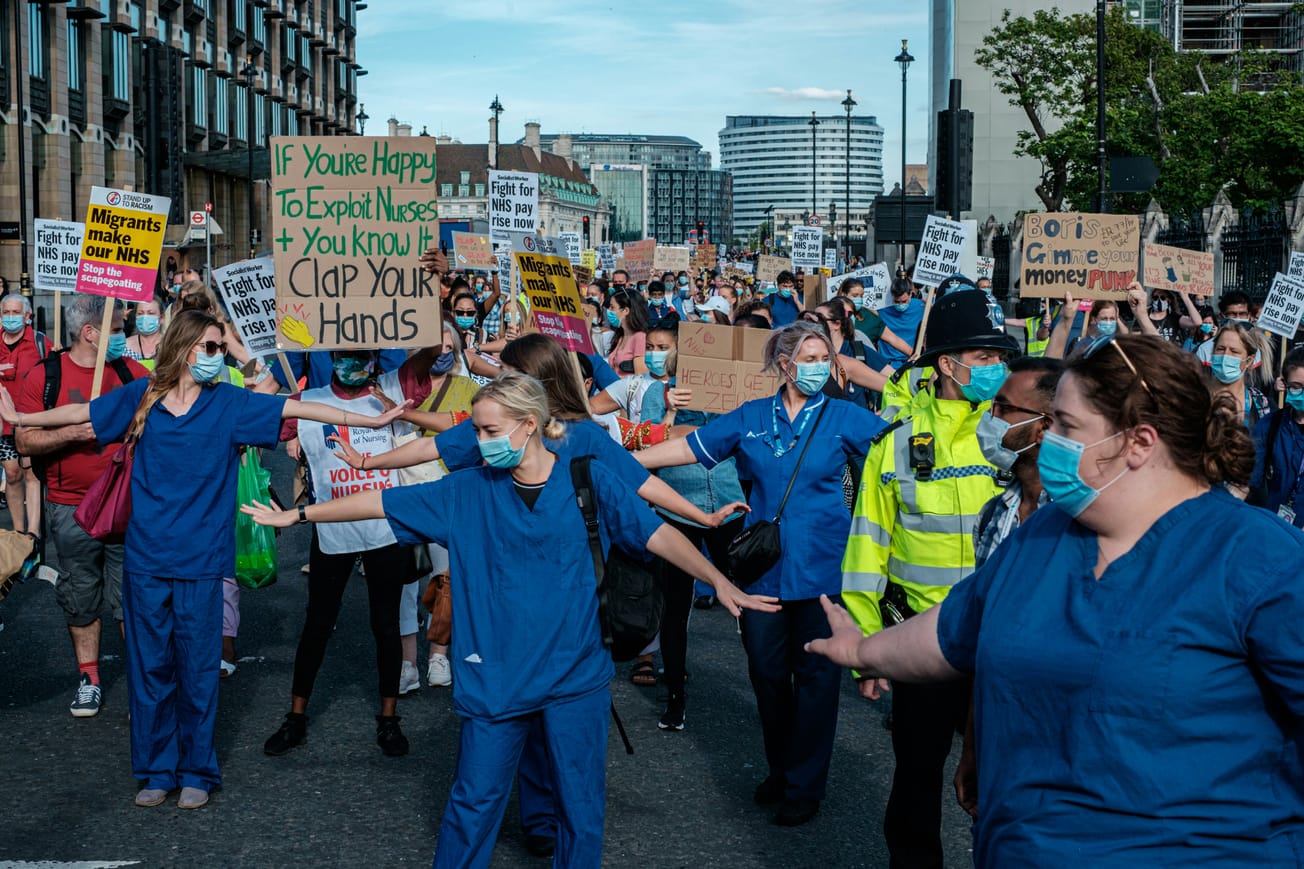By Sagal Khalif, First Year, Law
Medicine is one of the most oversubscribed courses across British universities, with an average of 25,000 students applying every year.
Since nurses went on strike for the first time in late 2022 — contesting poor pay and unsafe staffing levels — industrial action has become increasingly prevalent within the health sector.
Following a protracted standoff between the government and the British Medical association (BMA), junior doctors will stage a four-day walkout between the 24th and the 28th of February.
Doctors, we pulled out all the stops to avert this round of strikes.
— Junior Doctors (@BMA_JuniorDocs) February 9, 2024
We asked the health secretary to extend our strike mandate for four weeks so we could keep talking in good faith. But she declined, leaving us no choice but to announce a 5-day full walkout from 24-28 Feb. pic.twitter.com/t8iW4uDJDK
Since March 2023, it is the 10th time that junior doctors have undertaken industrial action, striking against the steady erosion of pay since 2010 and unsustainable conditions within the NHS.
After more than a year of industrial action within the health sector, the failure of the BMA and the government to reach a resolution has produced stark ramifications: more than 1.4 million appointments and procedures have been delayed, straining a health service which currently holds a backlog of over 6 million patients.
Epigram spoke to two fifth-year medics, Harry and Grace*, to hear their views on the strikes, the impact they have had on their studies and whether they believe industrial action will deter the next generation of medical students.
Left: Rishi Sunak blames strikes for the NHS waiting lists
— Farrukh (@implausibleblog) February 6, 2024
Right: Sir Michael Marmot explains how underfunding the NHS by the Conservative party has caused the NHS waiting lists, not the strikes pic.twitter.com/cnjh4rIBN4
Despite witnessing the steady disintegration of the NHS, both Harry and Grace emphasised that they still enjoy working with patients. Harry stressed the importance of ‘Separating the politics from the work.’
Grace said that: ‘Although I believe the government does not have my interests at heart, I don't see myself doing another career.’
When asked whether they thought industrial action would have been resolved by now, Grace said that ‘I did not not expect the strikes to last this long, as I thought that doctors' requests for higher pay would be respected sooner by the government.’
Just going to resurface this interview from September 2023, seeing as we are still facing misinformation from this government and NHS leaders around doctor strikes
— Dr Sandeep Bansal (@iDrSunny) February 13, 2024
👇🏽
pic.twitter.com/h9Dq1olftV
Similarly, noting the inability of the government to reach a settlement, Harry said that ‘I don't think I ever had faith in the government to bring the strikes to an end, and I don't think I necessarily predicted they would have handled it this badly.’
These sentiments are seemingly echoed by the general public: a September 2023 YouGov poll found that voters blamed the government more than the BMA by a margin of 45 per cent to 21 per cent.
When asked whether she believed that ongoing strike action, the underfunding of the NHS and the stagnation of wages within the health sector would potentially deter future students from pursuing medicine, Grace said that ‘I definitely foresee a drop in students pursuing medicine, if not a drop in the number of students staying to practise in the UK.’
‘I recognise it’s going to be hard to stay motivated because a lot of other jobs start out on a much higher salary, and with a lot less stress’
Contrastingly, Harry discusses how the health sector will continue to attract graduate doctors: 'Regardless of whether the NHS continues or not, there is still going to be work in being a doctor. People will recognise that, people will go into medicine but for slightly less compassionate reasons.’
Expanding on this, Harry said:
‘We will see people who want to go into private practice or non-medical, clinical facilities. We will also see a lot more people who want to go abroad after they graduate, do two years in the NHS and then go to Canada or Australia.
‘If all that fails, you will always have international students who want to come and study at good institutions and then head back home highly respected. I don't think we will see a drop in the number of doctors produced but more so where they end up working and the reasons they study.’
Similarly noting the allure of moving abroad to pursue work in the health sector, Grace said that ‘I foresee a drop of students staying to practise in the UK. The majority of my friends are going to move to Australia to work and I am also thinking of doing this.’
“The tragedy of this is that this is completely unnecessary. There has been plenty of time to talk and come to an agreement. That time hasn’t been used well by government.”⁰
— The BMA (@TheBMA) February 10, 2024
Council chair @DrPhilBanfield explains to @SkyNews why @BMA_JuniorDocs have called strikes this month. pic.twitter.com/LfdF8Dme9w
This is reflective of a broader trend among junior doctors and nurses: a study published in BMJ Open found that one in three medical students plans to quit the NHS within two years of graduating, allured by the better pay and working conditions that countries such as Australia and Canada offer.
Touching on the difficulties that would come with potentially remaining with the NHS, Grace said ‘I recognise it’s going to be hard to stay motivated because a lot of other jobs start out on a much higher salary, and with a lot less stress.’
Unsustainable and strained workforce conditions have also contributed to a mental health crisis within the NHS: as of 2022, doctors and nurses had taken an accumulated total of 23,000 years off for mental health problems since 2017.
‘A lot of junior doctors that I speak with at the moment say the same thing, that it becomes more and more difficult to renew the strikes yourself when you see the waiting lists go up
Describing his apprehension at entering a workforce in which these problems are so prevalent, Harry said:
‘You see the pressure people are under, you've been there for six years and have sacrificed quite a lot of time earning this degree to get into this profession. It’s troubling seeing the quality of life that often comes after you graduate, and the figures for the number of junior doctors who are experiencing burnout.’
A recent introduction of a medical doctor degree apprenticeship, under the NHS Long Term Workforce Plan, may be an answer to providing an alternative pathway to medical school and boosting the number of doctors and nurses in the health service.
However, this scheme, which aims to tackle the backlog of over 6 million patients and attract more doctors to the NHS, has faced criticism.
In response to the announcement of this new workforce plan, Richard Murray, chief executive of The King’s Fund, said: ‘While the announcement includes a welcome commitment to boost staff training places, we are yet to see much of the detail on the measures to retain current NHS staff, or to improve the culture and working environment of the health service.'
In spite of the legitimate reasons many have for undertaking industrial action, Harry describes how junior doctors are acutely conscious of their duty of care towards patients: ‘A lot of junior doctors that I speak with at the moment say the same thing, that it becomes more and more difficult to renew the strikes yourself when you see the waiting lists go up. People aren't striking because they don’t care about the patients.’
Navigating change: Experiencing the transition from rural to urban living
Inaccessibility in university sport: The economic realities of joining a sports society
‘I was speaking to another doctor who I met on Monday and I worked with at Bath, and she said she has been on every junior doctor’s strike. It’s really difficult for me to get myself out on the picket line because I know my patients are suffering — but I know they are going to suffer just as much if I don’t strike.’
*names have been changed for anonymity.
Featured image: Ehimetalor Akhere Unuabona / Unsplash








